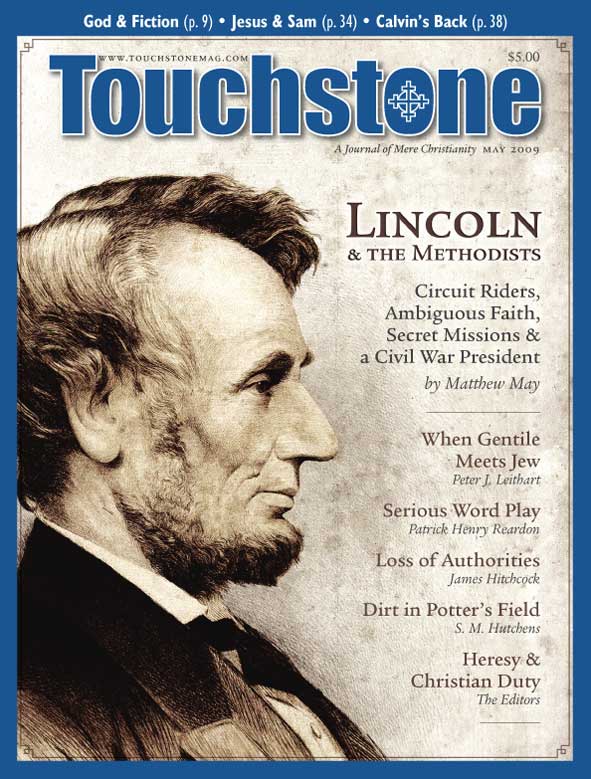View
Losing Our Grips
James Hitchcock on the Cultural Suicide of the Newly Enlightened
As the European birthrate continues to decline—a demographic catastrophe that may result in a predominantly Muslim continent within fifty years—it is tempting to see in it a pattern of conscious cultural suicide, validating one of the numerous theories of history that postulate human society as following a biological lifecycle, like aging animals resigned to being left behind by the pack.
But the reverse is more nearly true. Most Europeans probably prefer that the ethnic character of their various countries survive, but only so long as other people bear children and accept the responsibility for raising them. Self-consciously modernist Europeans, and their disciples in the United States, are governed by feelings not of obsolescence and exhaustion but of arrogant self-regard, and crucial to their self-identity is their belief that they have purged themselves of the prejudices of their ancestors and have reached a new level of enlightenment.
This arrogance is obscured by the phenomenon of “multi-culturalism,” which seems to require the humility of Westerners before other cultures. But multi-culturalism is now simply the chief way by which Westerners manifest their enlightenment, in that being multi-cultural does not mean being inferior to non-Westerners but being superior to other Westerners.
Disconnection at the Root
The cultural decline of Western Europe is most extremely manifest in the European Union’s refusal, in its Constitution, to acknowledge Christianity as having even historical importance. If properly respected, that Christian past would require contemporary Europeans to look beyond themselves and their own sensibilities to connect with enduring truths in ways that impinge on the modernist notion of liberation.
The modernist project, which inevitably culminates in “postmodernism,” has been the systematic “unmasking” of all claims to self-evident truths—religious belief is held as irrational, the family as repressive, patriotism as ignorant chauvinism, democracy as a cover for privileged interests—and in each case a continued commitment to traditional beliefs would require people to transcend their sense of themselves as the focal point of the universe.
At the root of cultural modernity is man’s disconnection not only from a sense of eternity but from a coherent understanding even of human history, a fragmentation and isolation that preclude any sense that people are part of realities larger than themselves. The general decline in the knowledge of history and the corruption of historical studies by ideological orthodoxies are both causes and effects of a cultural malaise in which people believe in no world larger than themselves and in which the traditional grand narratives—religious faith, patriotism, freedom—have been discredited.
In the United States the conflict over the nature of modernity is conveniently represented in the division between “red” and “blue” states, but not only are questions still alive in America that were long ago settled in Europe, thus far some of them seem to get resolved in ways opposite to the path Europe has chosen.
Malaise of Church & Media
However, the symptoms of cultural suicide naturally manifest themselves in those American institutions that are self–consciously modernist and enlightened. The story of the liberal churches has been told many times, but their catastrophic decline is merely one instance of a pattern that exists throughout the culture.
Journalists chronicle, and to some extent celebrate, the malaise of institutions, often warning religious leaders, for example, that they risk alienating the faithful with their orthodox teachings. But those same journalists are understandably more circumspect in acknowledging something only recently noticed by the public—that there has also been a major decline in public attention paid to the “prestige media” and, as with the mainline churches, efforts to stop this hemorrhaging have not been successful. In a sense, the troubles of the Episcopal Church and the New York Times are identical.
Both the churches and the media have brought their troubles on themselves, and in the same way—by systematically alienating their more conservative supporters, driving away precisely the people who were at one time the most loyal—and the unanswered question is why they fail to attract newer and more liberal constituencies in equal numbers. As the cliché has it, nothing is so dead as yesterday’s newspaper, but that was no less true a century ago than it is now. Most newspapers of the past were deliberately ephemeral, many no better than today’s National Enquirer, but the best of them aspired to be in effect guardians of the culture.
Through much of its history the Times disdained even to publish comic strips and ignored popular culture almost completely, an austerity that was only somewhat less severe in other self-consciously “serious” publications. But in the past four decades even the most pretentious media have come to traffic in gossip about film stars and rock singers and to treat pornography as an art form due the reverence once given to religion.
Simultaneously, serious treatment of public events has declined, as journalism struggles to find “human interest” angles that spare readers the necessity of engaging in serious thought. No particular media can make compelling claims for attention, because what is “significant” is merely whatever catches public attention at a particular moment.
Self-Negating Institutions
The problem of the liberal churches was diagnosed long ago. People seek in religion guidance to the meaning of life, and a church that in effect tells people, “We have no unique wisdom to offer, only the common human search for meaning,” eventually loses even many of the people who share that uncertainty, because there is nothing the churches can offer that is not better available in many other places. Something similar has happened to the media, which embody the postmodernist outlook that makes the forest of cable television channels and the infinity of websites more appropriate means of communication than the Times or CBS. There are no longer any authoritative journalistic voices.
Many a religious leader has worn himself out, and spiritually bankrupted his church, in futile efforts to win credibility with self-consciously postmodernist people for whom secularity is fundamental to identity. Similarly, Arthur Gelb, a retired editor of the Times, laments in his memoirs that his paper lost credibility with “the young” during the 1960s by being insufficiently sympathetic to the New Left, and he worries that it never regained that credibility. Just as liberal clergy failed to understand that the counterculture was of necessity antagonistic to any even remotely orthodox kind of religion, so Gelb misses the point that the New Left was a standing negation of everything that “prestige journalism” was supposed to stand for, beginning with any notion of objectivity or even fairness.
The embrace of postmodernism by both the media and the churches is like attempting to quench a thirst by drinking salt water—whatever temporary relief it provides merely exacerbates the underlying problem. Not coincidentally, this has been accompanied by an ideological lurch in which, for example, the National Council of Churches has become nothing more than a propaganda agency for leftwing causes and the screeds of Frank Rich, Michael Moore, and Maureen Dowd are offered as serious political commentary. Both the “mainstream” churches and the “mainstream” media helped create, and now cater to, people who consider their own feelings the ultimate criteria of reality and who are unreachable on any other basis.
High Culture Discredited
The “public” is no longer a public at all but an infinite number of individuals and groups locked into an endless variety of small worlds, uninterested in connecting with the larger world. The importance of “blogs” in the 2004 and 2008 elections was due precisely to the prevailing belief that there are no sources of objective information, only a series of “viewpoints,” just as the truth of religion is judged by the degree of “relevance” it has to the individual.
In some ways an even more telling crisis, much less noticed than the churches and the media, is the decline of support for classical music. As the sales of classical recordings decline, many radio stations, including public radio, abandon music for a “talk” format.
This decline is the direct result of the postmodernist discrediting of the very idea of high culture, of the abandonment of the idea of the canon on the part of cultural leaders. Left to themselves, most children always found serious music difficult to comprehend, but they understood that, as part of the process of becoming educated, they should learn to appreciate it and that failure to do so would brand them as not fully civilized.
But in the 1960s it became almost de rigeur for classical composers and performers to profess their great love of rock music, hoping to prove the relevance of classical music to “the young” by pointedly refusing to affirm the superiority of the classics, just as liberal clergy refrained from affirming that belief ought to triumph over doubt. Now cultural leaders, including the “serious” media, offer no basis for claiming that Mozart is superior to Eminem; any such claim would immediately provoke indignant charges of snobbery and “elitism.”
Universities as Conduits
If the roots of the cultural malaise lie in the nature of postmodernism itself, the universities are the principal conduits through which that malaise is spread, so that the ironically named institutions of “higher” education offer courses in rock music, pornography, and comic strips that are treated as having equal validity with the study of Shakespeare or Rembrandt. Many educators see their task as precisely that of disabusing students of any notion of objective, enduring values transcending the experiences of individuals and favored social groups and of providing their students with spurious justifications for a culture of mere impulse. The attitudes that have led to a continuing decline in the patronage of the liberal churches, the media, and classical music have been propagated in the universities for at least four decades.
There is great irony here, because the universities are themselves institutions whose existence presupposes classical values and enduring truths, and educators’ role in society can only be justified on the assumption that they possess a wisdom that the young lack. But while the corrosive acids of modernism have been effectively poured on many traditional aspects of the universities, from classical languages to fraternities, they have not been used on the universities as such, which continue to flourish solely for a reason that traditional humanistic education always sought to overcome—they are thought to be the key to economic success. Having attained the power of certification in the workforce, universities continue to be indispensable in ways churches, media, and symphony orchestras no longer are.
The parallel decline of American religion, communications media, and music, like the decline of the European birthrate, shows cultural suicide not as an inevitable and impersonal force but as the result of innumerable limited, not fully deliberate, personal decisions by people who are products of a culture that gives them no sense of anything larger than themselves and who, in Livy’s famous judgment about his fellow Romans, have reached the point where they can neither endure their vices nor face the remedies needed to correct them.
James Hitchcock is Professor emeritus of History at St. Louis University in St. Louis. He and his late wife Helen have four daughters. His most recent book is the two-volume work, The Supreme Court and Religion in American Life (Princeton University Press, 2004). He is a senior editor of Touchstone.
subscription options
Order
Print/Online Subscription

Get six issues (one year) of Touchstone PLUS full online access including pdf downloads for only $39.95. That's only $3.34 per month!
Order
Online Only
Subscription

Get a one-year full-access subscription to the Touchstone online archives for only $19.95. That's only $1.66 per month!
bulk subscriptions
Order Touchstone subscriptions in bulk and save $10 per sub! Each subscription includes 6 issues of Touchstone plus full online access to touchstonemag.com—including archives, videos, and pdf downloads of recent issues for only $29.95 each! Great for churches or study groups.
Transactions will be processed on a secure server.
more on culture from the online archives
more from the online archives

28.2—March/April 2015
Man, Woman & the Mystery of Christ
An Evangelical Protestant Perspective by Russell D. Moore
calling all readers
Please Donate
"There are magazines worth reading but few worth saving . . . Touchstone is just such a magazine."
—Alice von Hildebrand
"Here we do not concede one square millimeter of territory to falsehood, folly, contemporary sentimentality, or fashion. We speak the truth, and let God be our judge. . . . Touchstone is the one committedly Christian conservative journal."
—Anthony Esolen, Touchstone senior editor












